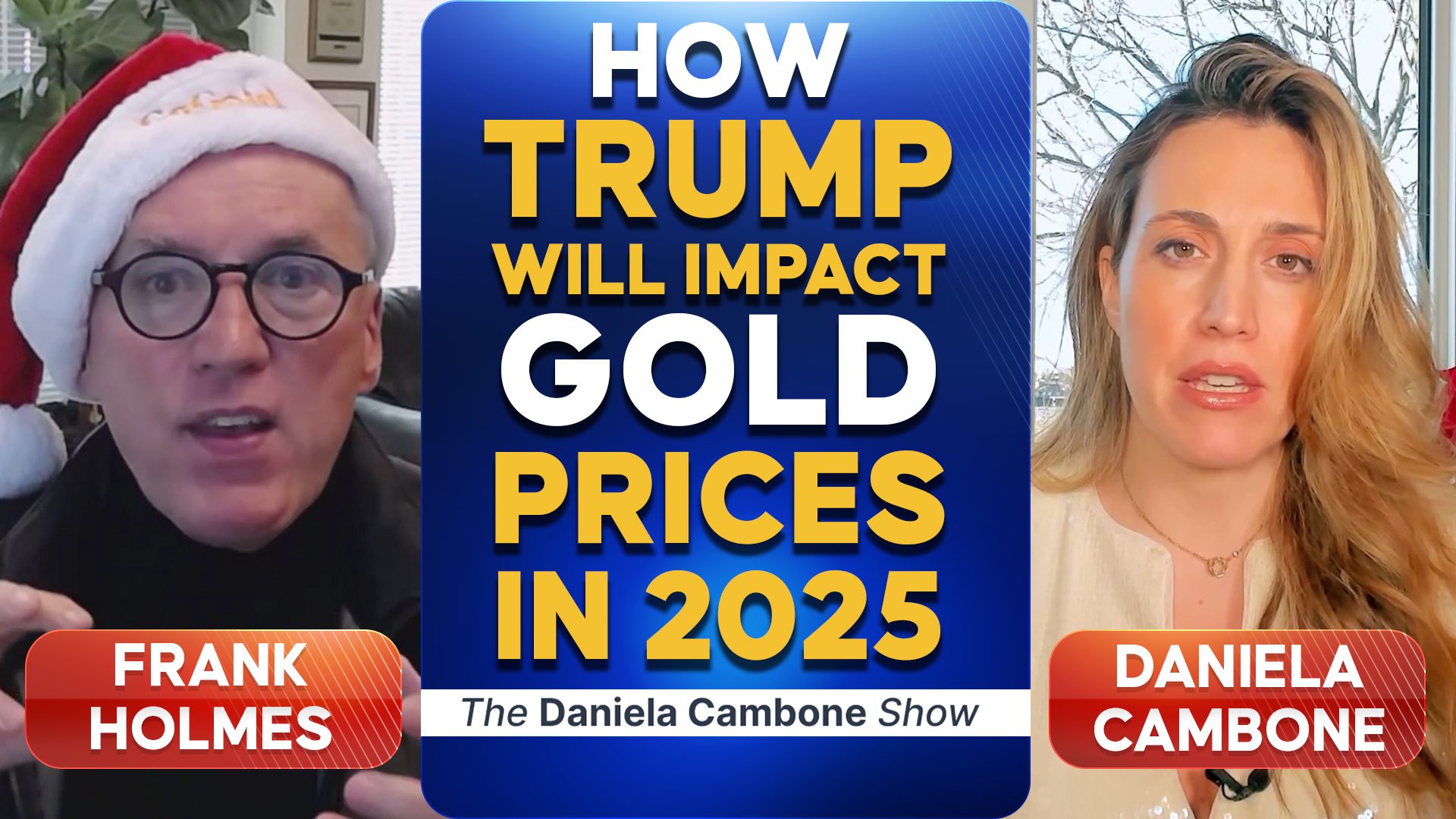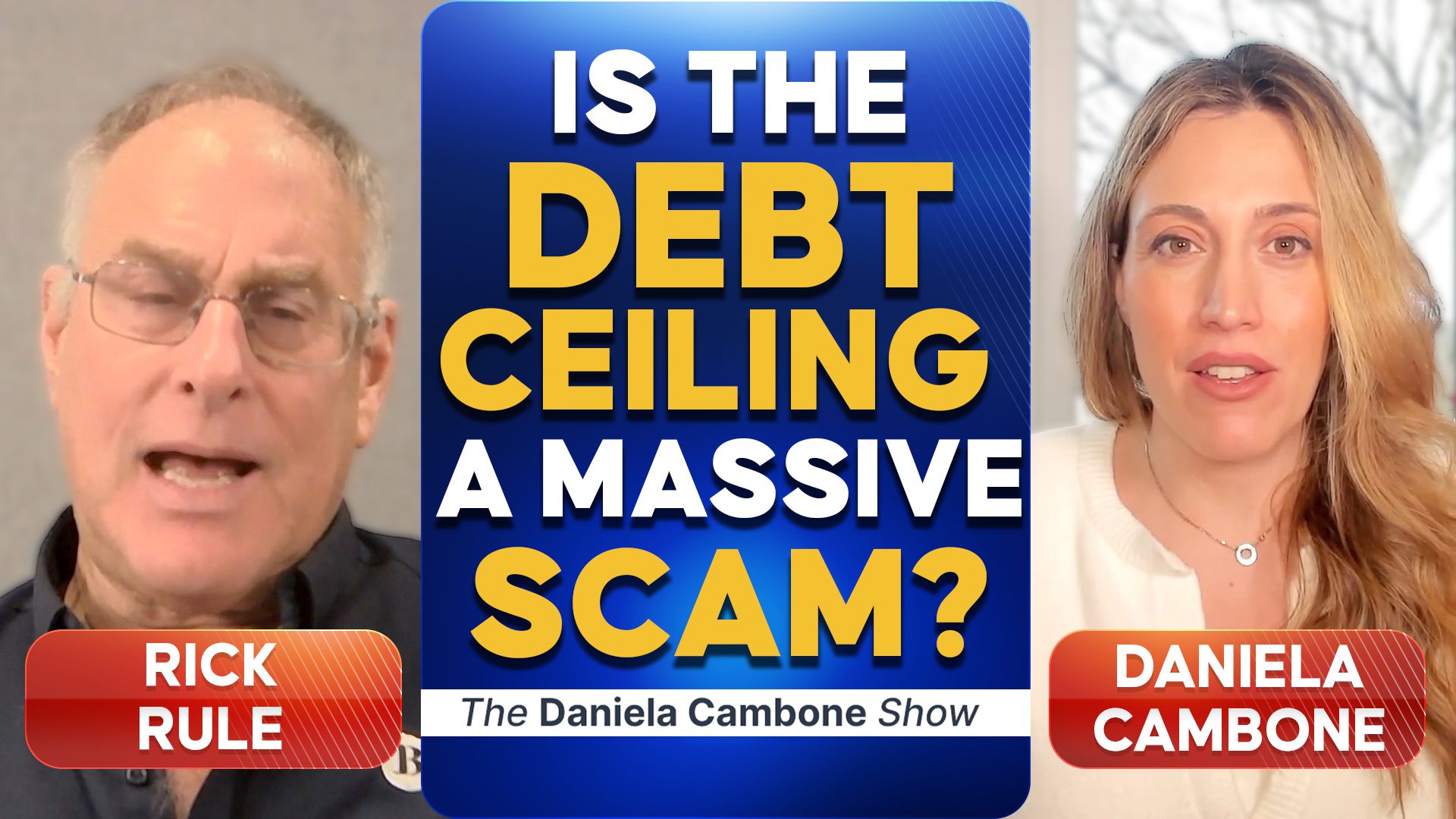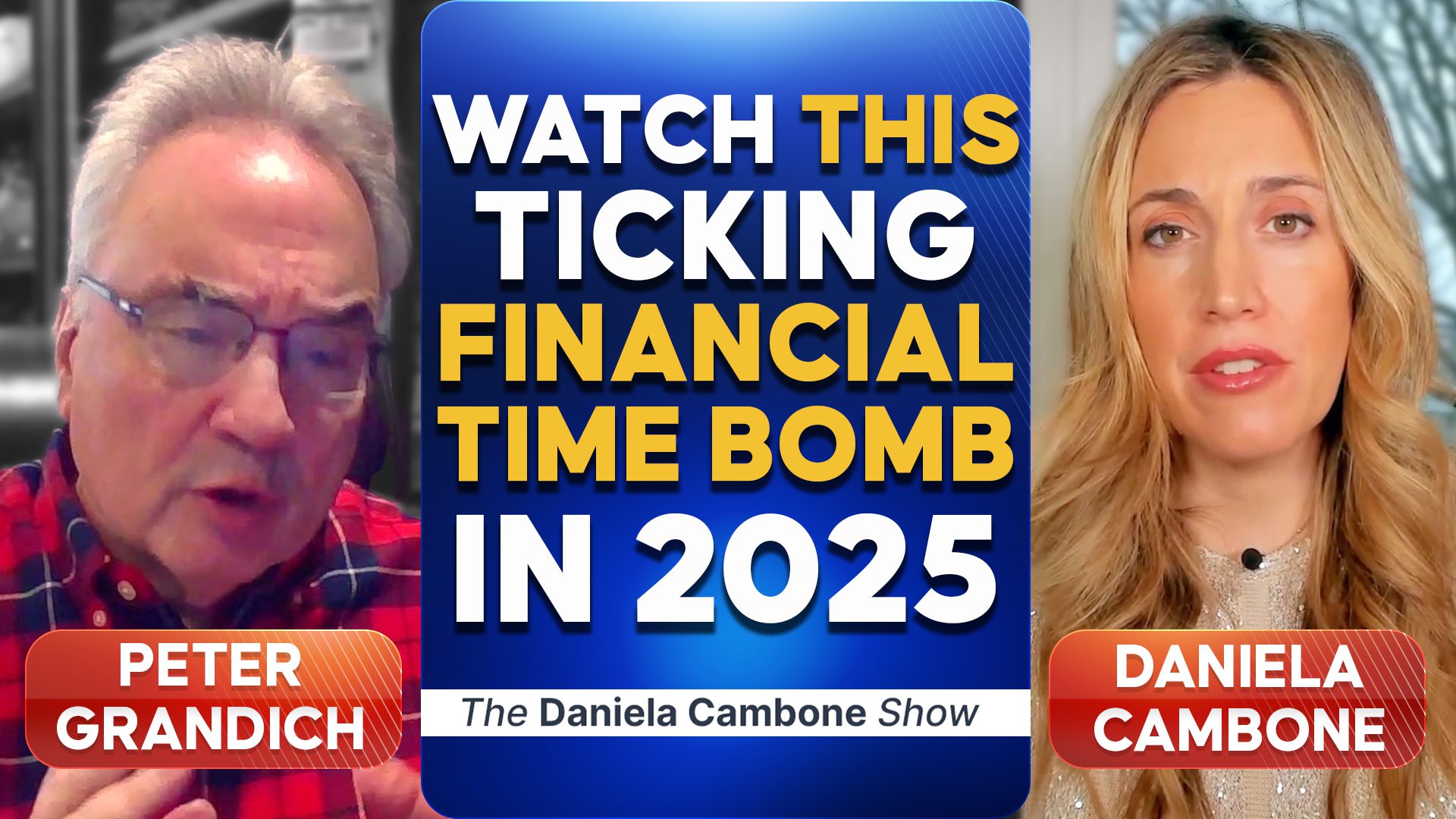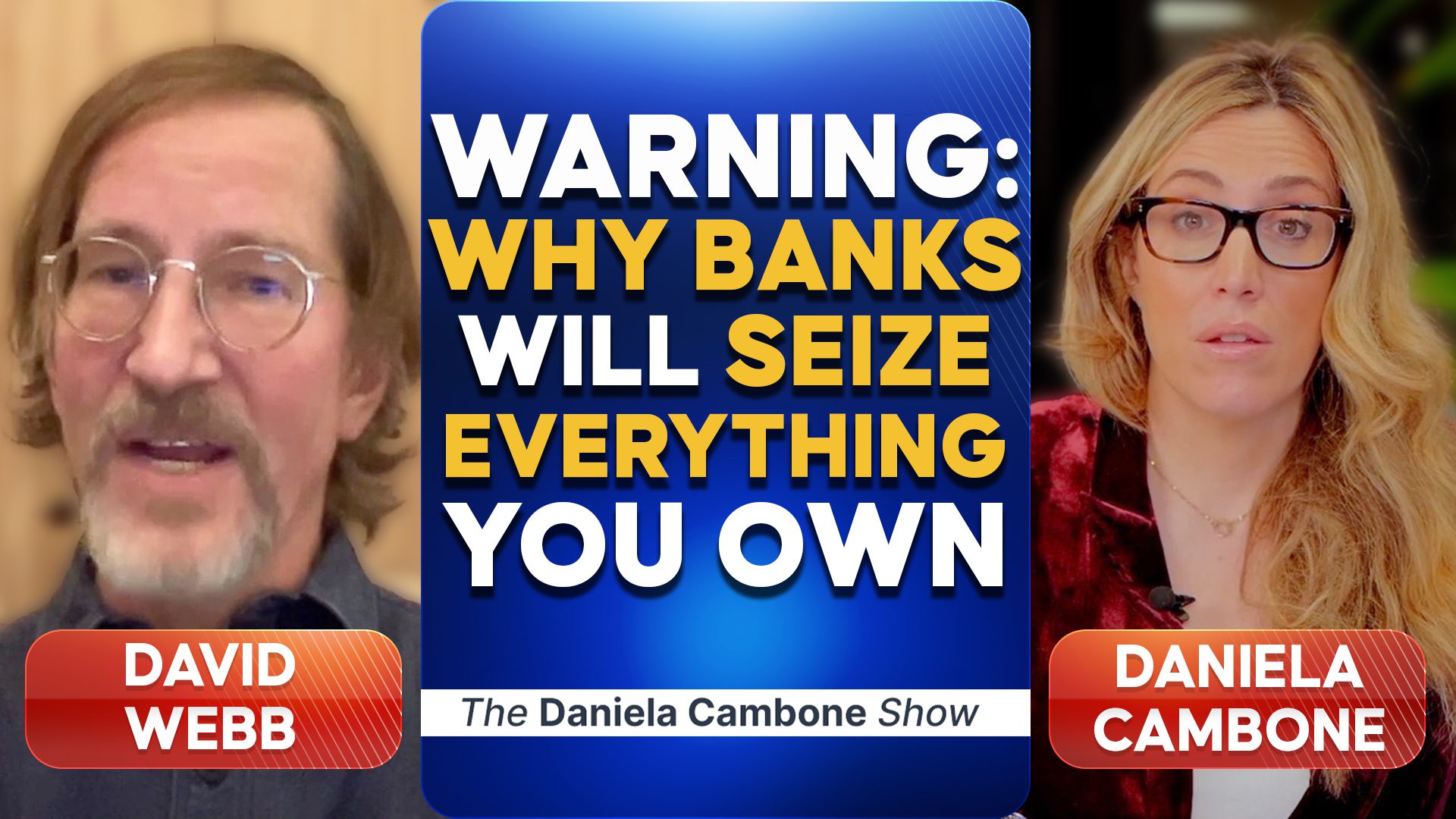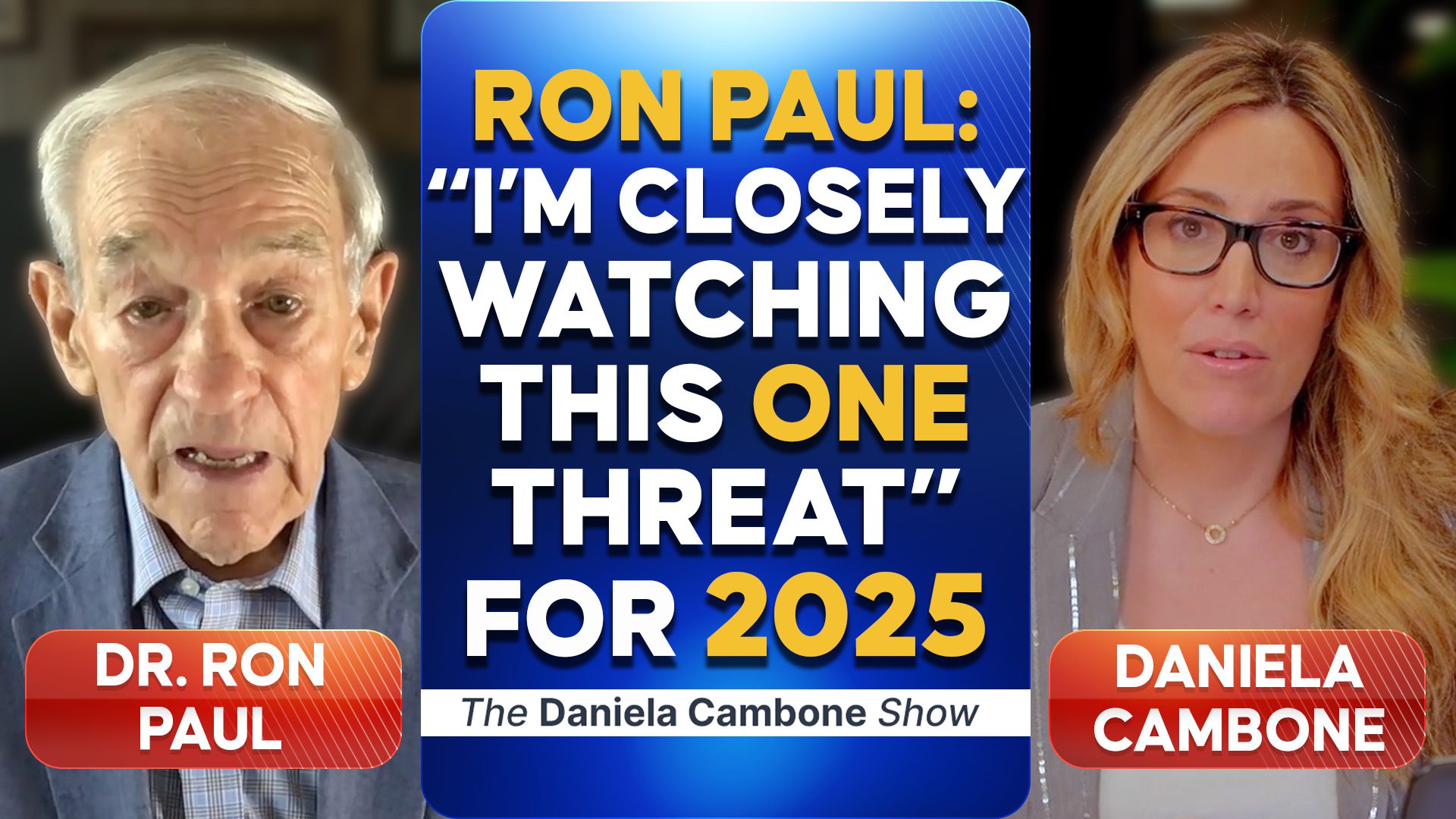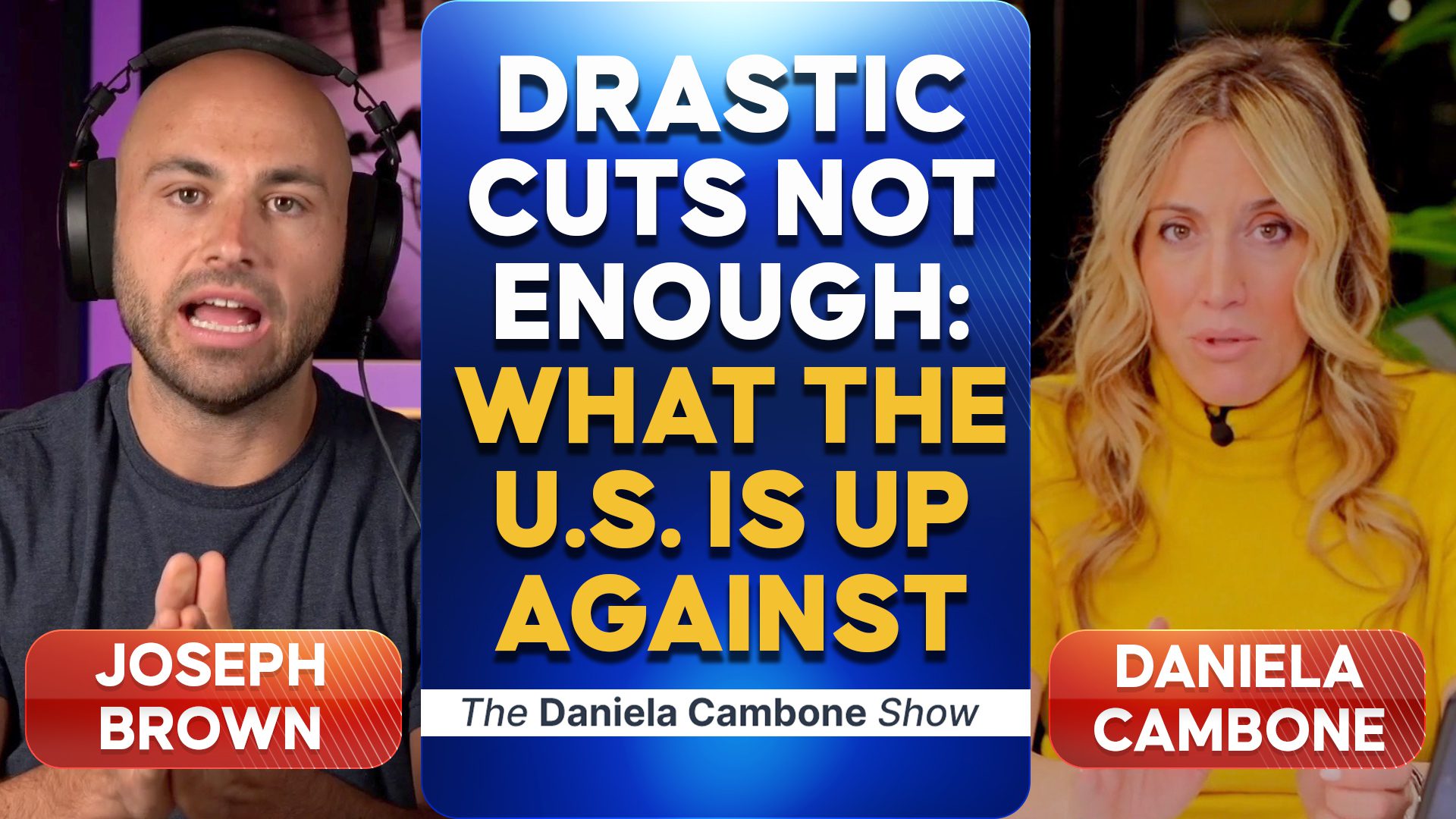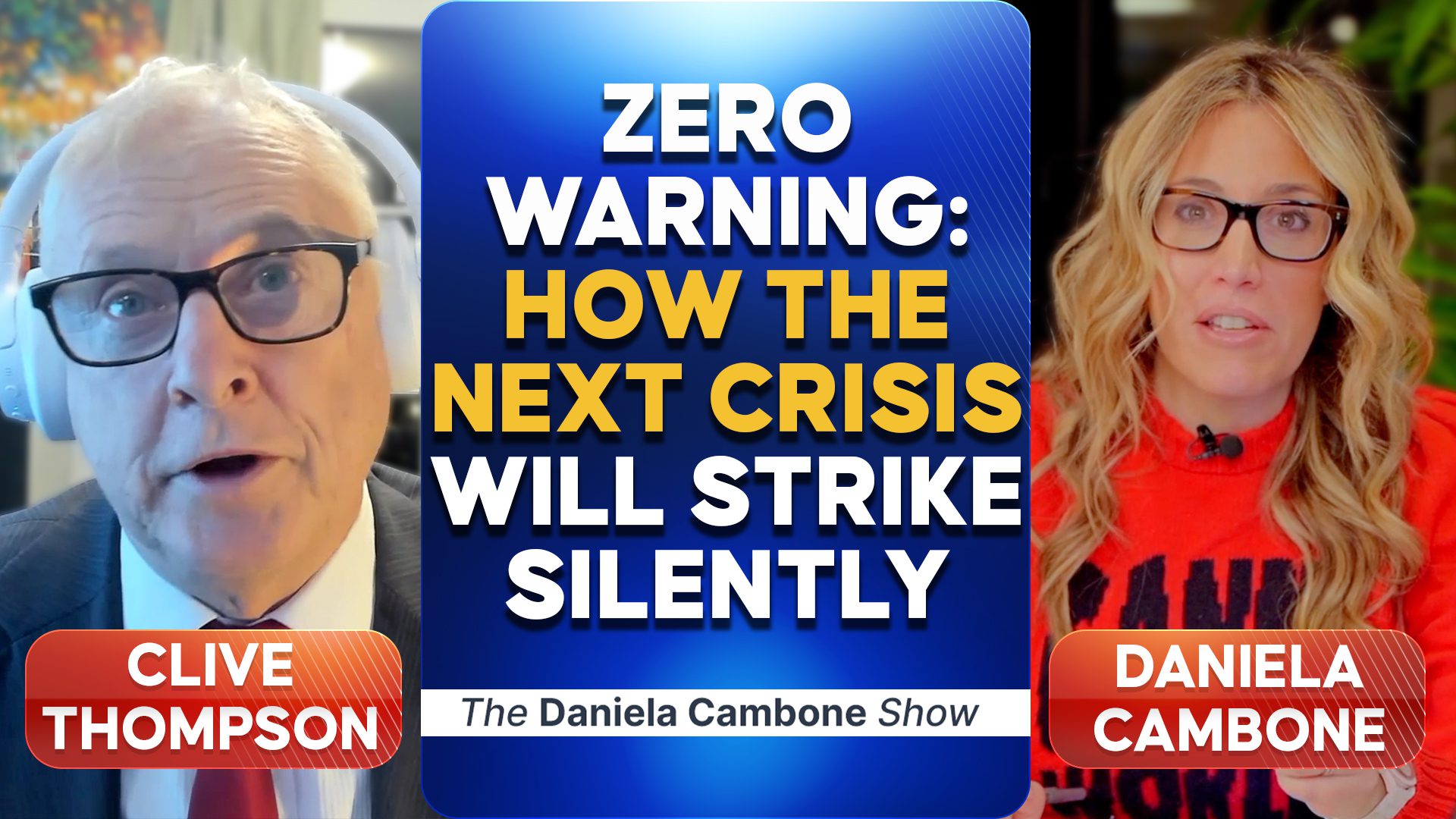Hundreds More Banks Risk Failing This Summer: Nothing Was Fixed Warns Top Economist

“At this point, we have a banking system that is sick. I mean, it’s just crippled,” says Peter St. Onge, a former MBA professor and Ph.D. economist. In an exclusive interview with Daniela Cambone, St. Onge delivers a stark warning about the fragility of the US banking system, revealing the alarming dependence on the Treasury and Federal Reserve for financial survival. Without their support, he asserts, “the entire US banking system for sure would be bankrupt.”
St. Onge also criticizes politicians for being woefully out of touch with the real issues facing ordinary Americans. “They don’t even appear to be paying attention to what the people want. They’re going after farmers for cow farts when the issue is that the median voter can’t afford to go to McDonald’s. I mean, they’re just almost comically out of touch,” he remarks. Watch the interview to learn more about his views.
CHAPTERS:
00:00 Regional banks risk
4:44 Bailout
8:01 Assets in the banks
12:12 Jobs number
17:48 Reality for consumers
22:20 Crypto and Donald Trump
24:30 El Salvador
TRANSCRIPT FROM VIDEO:
00:06
This is Daniela Cambone, welcome back to the Daniela Cambone show. Well, just when you thought maybe we could take some sort of side of relief when it came to bank crises, it looks like we’re not out of the woods yet because consulting firm Claros Group just analyzed about 4,000 US banks and found that over 280 are at heightened risk right now. So not out of the woods yet.
00:32
Here to talk about this and so much more, please welcome back to the show Peter St Onge, economist over at the Heritage Foundation. Peter, so good to see you. It is great to be back. Thanks for having me on. Yeah, well, lots to talk about. I thought we’d start with hundreds of regional banks at the risk of failing. Could we see a rerun or worse of what we saw last year?
00:59
and then we’ll talk about how the Fed plays in. But first, are you surprised to learn that so many banks are at risk here? Not in the least, you know, nothing has been fixed since last year. Wall Street was pretty slick, right? Back in 2008, when they screwed up and had all their gambling losses that we’re gonna send all their banks.
01:25
um out of business they had to come begging hat in hand to the taxpayer and over the 15 years since the 2008 crisis they’ve invested a ton in lobbying right and setting up those bailouts ahead of time and so we saw that in 2023 where they essentially they didn’t have to ask for the money right i mean literally like the fed and janet yellen were just shoving the money down their throat
01:53
Janet Yellen effectively expanded FDIC to cover $20 trillion in bank assets. The Fed allowed banks, they gave them sweetheart loans on fictitious assets. This is mafia behavior. And the beauty of it is that the banks didn’t have to ask for any of it. They had already pre-lobbed it. But the problem now is that nothing was actually fixed. You didn’t have oversight. You didn’t have oversight after 2008 for sure.
02:21
right? They didn’t put money into, you know, trying to make the financial system more stable. On the contrary, what they put their money into was to getting these automatic bailouts. So at this point, we have a banking system that is sick. I mean, it’s it’s it’s just crippled, like without Treasury and the Fed standing by to give them unlimited amounts of money, the entire US banking system for sure would be bankrupt. I mean, sorry, technically bankrupt because fractional reserve, but it would the entire
02:50
thing would collapse. And so at this point, the question is just are they going to get an unlimited amount of free money from Treasury and the Fed, but the underlying banks continue to get sicker, right? So their bond portfolios collapse because interest rates soared, their commercial real estate portfolios, so something like a third of smaller banks in the US, okay, a third of their assets are commercial real estate, commercial real estate got a one to punch not only
03:19
Did it get savaged by higher interest rates, which, you know, those can drop long-term assets by a third or more. Okay, not only do they get hit there, but of course, US cities are collapsing, as are Canadian cities for that matter. A lot of businesses don’t want to be in the city anymore, right? The risks are too high between the crime, the urban mismanagement, the taxes, the regulations. So a lot of that commercial real estate now, it’s going asking, right? It’s going begging, like you’ve got these
03:49
large buildings in places like Philadelphia or Pittsburgh, like healthy cities, these are not dying communities. These things are going for a third off, two-thirds off, 80 percent off. San Francisco is a complete catastrophe. It used to be that you had to sell your first born to get office based on market street. Now it’s empty. You’ve got four rent signs everywhere. You put all those together and banks are in a ton of distress.
04:17
they increasingly subsist on bailouts from the Fed and from Treasury. It means the banking system itself just gets sicker and sicker and sicker. At some point, there is a reckoning. And of course, all of that is gonna go right onto taxpayers and it’s going to go onto dollar holders in the form of inflation in the US dollar. So well explained. So a couple of points there, because this ties into what should be the Fed’s mandate, because…
04:46
The first mandate it was created to safeguard the dollar, pardon, then it was, okay, pump jobs as much as possible. But now, as you’ve written Peter, it seems we have a third mandate that you could argue started it back in 08 of bail out everyone, right? Right. And you raised the point, well, how…
05:08
much longer can that go on for when does this unlimited supply of money of bailouts? When does that end? I mean, is the child just spoiled forever? Right. And, you know, I mean, obviously, the Fed was sold, right? When it was established in 1913, it was sold as having one single purpose in life, which was protecting the dollar, right? Allegedly, you needed an elastic
05:36
money supply because you know Christmas people need more cash to buy things or when the harvest comes in. Right so they sort of use that as the excuse and the fundamental pitch to voters was if you set us up and we’re going to protect the dollar we’re going to protect the financial system we are going to be this rock of stability. And as you say that has morphed over the years it’s been eroded by politicians to the point where first it became really the so-called dual mandate.
06:06
where on the one hand they protect the dollar, on the other hand they artificially inflate the economy. Of course, those are directly in opposition to each other. And so it was really the Fed sort of choosing the headlines. So a little bit of inflation, a little bit of joblessness. And that has now morphed really since 2008 where you’ve got this third mandate now where the Fed will drop everything, right? It will ignore inflation, it will ignore jobs if the banks are in trouble.
06:35
And of course, the Fed did that itself. My former professor, Russ Roberts, over at George Mason, he had a great metaphor for what the banking system’s relationship is to the Fed, which is that the banks at this point are a bunch of gamblers. They go out. They lay these bets at the casino. Every time they win, they keep the winnings. They don’t share the winnings with taxpayers. I mean, they get taxed, but beyond that. On the other hand, whenever they wipe out, when they, you know, they
07:04
They throw their watch on, they throw their wife on the kiddie, right? They go all in, Texas hold them, they wipe out, and guess what? They turn around and they call the taxpayer and they say, hey, I’m going to need you to cover this, right? So that is, I mean, it’s a sick relationship. That’s something that, you know, it offends people, I think really of all stripes. It offends left wingers, it offends right wingers. You know, the Occupy Wall Street and Tea Party right back in the 2008 crisis.
07:30
They all agreed. They were all on the same team. They thought that the bankers were bastards and need to be leashed. They need to be put under control. The bailouts needed to be ended. But unfortunately, of course, the bankers have big checkbooks. You know, they have Rolodexes. They know which senators to call. And so it has actually gotten worse since then to the point where the Fed, it’s not protecting the dollar. It’s not even protecting jobs. It’s protecting banks first.
07:56
And then if there’s anything left, then yeah, maybe we’ll try to get inflation down. We’ll try to get jobs down. So that’s really the afterthought now for the Fed. And before we move on, because we have other topics to cover, I’m just curious. I mean, what does Peter St. Ange do with this information? So you’re fully aware of the banks, at least at the regional level are in crisis. The Fed is basically holding up the system and when they decide that they can tumble or close the Fed has that control. So.
08:24
What does that make you concerned about having your assets in the bank? I mean, what would be your advice to people watching this concerned about the banking system? Yeah, I mean, assets in the bank, they are protected by the FDIC. That’s all paper guarantees, right? So really what they’re protected by is politicians’ fear.
08:50
that if they actually allow bank deposits to be wiped out around the country, then they’ll lose their jobs. That’s fundamentally, it’s like the political survival standard is what protects these things. And so that means that in the near term, if your, assets are like 50,000 at the bank or something, you’re almost certainly going to be fine. If you’ve got much bigger assets, a $600,000 or a million dollar account, maybe because you have a small business,
09:17
Traditionally there you’re at risk, but of course what happened last year with the banking crisis is that Janet Yellen just kept swooping in and guaranteeing even those massive accounts that traditionally had not been guaranteed. So I think in the near term, people don’t have to worry about their bank deposits. Now once banks start collapsing again, there is some theoretical point where there’s just not enough money in the kitty, right? They would have to print up too much, you would get inflation. Even if they’re trying to sort of
09:46
pre bail these things out, right? Things like the feds, sweetheart loans to banks. Either way, okay, the solution, the establishment’s solution to banking crises is to print more money. So in the long run, I think we are nearly guaranteed to have not just the kind of inflation we’ve been seeing, which is, you know, 2%, 2 to 3% rises in prices, but I think that we’re near guaranteed to see higher prices. That’s going to suggest for the average person that
10:17
you probably should not keep that much money in dollars. That would include bonds, right? A bond is just a dollar that pays a dividend. Rather, you should look at moving your assets over to something hard. That could be stocks, it could be real estate. Of course, the pure play on that is precious metals. That has always been the case for thousands of years. ITM who…
10:40
I think you know, it’s a very good provider there. They’ve been in the business for a very long time. I did not ask Peter to bring this up, by the way. Just sign up. He did not, he absolutely did not. But it is true that precious metals are a great way to protect yourself. If you look back to the 1970s, I mean, gold absolutely skyrocketed. It trounced inflation, this is from memory, but I think gold went up 30 fold or something. You may actually know the numbers better. Whereas inflation went up twofold.
11:08
So in an inflationary crisis, gold, silver actually holds up very well during inflation as well. And so for both of those, you do absolutely wanna go with somebody trustworthy. But yeah, I think for most people, what you’ve already gotten the bank, it’s not gonna evaporate, they’re gonna keep bailing out, especially in the early stages of a crisis. But having said, that means that your bank,
11:37
holdings are going to be made whole. Okay, you’re not actually going to make money on it. On the other hand, if you’re holding something like gold, then if you get an inflationary crisis, you actually make a ton of money on it. That can then cancel out whatever else happened to you. What’s your job? Well, thank you for that plug, Peter, I guess on that note, I’ll just remind folks that if you haven’t booked your calendar appointment with one of my wonderful colleagues, this is the time to do so. Okay, I said my piece.
12:03
Anybody who’s selling gold and silver is a friend of mine, so absolutely. All right. The other thing I wanted you to help make sense of, at least to me, so I hope other people in the audience are as confused, is what’s happening on the jobs front. Because we got the hurrays that, wow, over 270,000 jobs were created in the month of May. Hot month for jobs, fantastic.
12:32
We don’t know what the fed’s going to do now with this report. But on the other hand, Peter, job openings falling to the slowest level since February of 2021. Where does the truth lie? Break it down for us. What does it, what does it really look like? Yeah, this is the question. You know, there was a time, let’s say 10 years ago, where if you question government numbers, you were a crazy person. Okay. Like, you know, they.
13:01
they would call for you to refund your PhD or whatever. All right, nobody did that. And I think that a lot of us have kind of had our eyes open during COVID without getting into which agencies may have been deceptive. A lot of people are questioning these numbers. And when you look at the numbers coming out of the US, inflation, the official statistics, I think the last count is we’re looking at something like 24% inflation since the beginning of the pandemic. All right, but you see people posting their receipts online
13:31
You can look at fast food menu, right? These are out in the open. You can look up, you know, historical menus. There are websites that keep track of that because they love Americana or whatever. And when you look at those numbers, it’s more like 35, 50, 100%. Okay, so there’s been a lot of questions about the inflation numbers. By the way, if the government inflation numbers are way off, that also implies that we’re one heck of a lot poorer than we think we are, right? Like if inflation has actually been 50%, not 25%,
14:00
then actually we’re probably back to about 2000 levels of income. I mean, like 25 loss 25 years lost, you know, we’re like in Japan’s trades. But anyway, so that’s inflation. And now we’re seeing that on jobs as well. Right? So we just had a job report recently, where they said that payrolls went up by 272,000. Yet the number of people who say that they have a job is down by 408,000. That is a heck of a discrepancy.
14:29
We’re not talking one’s at 27, one’s down four. That is massive. Yeah, and so, you know, those are both government numbers. They’re coming from different departments who repeat each one, report each one. One of them is surveying employers. The other one is surveying households. And there is a, what, 700,000 gap in jobs in one month. And so when you see that kind of tremendous, and of course what’s driving that is that
14:58
People have this impression that government statistics, they’re like sitting there counting out all the jobs or something. No, they’ve got a tiny little response rate. Some of these surveys have 20, 30% response rates. And then they extrapolate that, they guess. Okay, they have no idea why the response rate is what it is. Maybe small businesses aren’t responding as much because they’re busy or who knows? They don’t bother asking, right? They just extrapolate this stuff.
15:24
They go back, they seasonally adjust. There’s been this huge debate in Washington about seasonal adjustment. That’s where you would adjust numbers. You know, you’d say, OK, well, construction is always low in wintertime because it’s cold. So, you know, if construction falls, let’s let’s correlate that against other years. All right. That’s perfectly legit. But the problem is that covid busted up their seasonal adjustments. And they’ve been admitting this. The Fed has been talking about this. Other central banks, other government agencies. The bottom line is in many ways, they’re flying blind.
15:53
Now, in normal times, you know, that’s a problem, obviously, if the government doesn’t really know what’s happening in the economy. But in these times, when you’ve got heightened inflation, you’ve got rolling stagflation, in many ways, you’ve got sort of this unfolding crisis that came out of the lockdowns. If you’re flying blind in that environment, that’s a serious problem because it means that both the Fed and Treasury could be doing things that are actually making the problem worse. So, you know, the Fed could…
16:22
They could continue hiking, which causes bank crisis. On the other hand, they could also cut too soon, which feeds inflation. So if you’re flying blind in this kind of a situation, it’s a major problem. And it makes it difficult for voters to even understand what they’re voting on. Right, so- Exactly. Right, if you look at a lot of the headline numbers in the US, and you know, this is the Paul Krugmans of the world are upset about this, that the paper numbers look really great for a lot of things.
16:49
The unemployment rate is still down around 4% in the US, which is historically low. Apparently, we created 272,000 jobs last week, in a manner of speaking. OK, so these things are fantastic. But then you’ve got to dig down into this and you’ve got to try to identify where the blind spots are. And you got to try to figure out what’s actually happening in the economy. And so they’re exactly. Yeah, exactly. So, you know, voters are seeing that right when you look at the approval ratings, whether it’s Joe Biden, Emmanuel Macron.
17:19
Justin Trudeau in Japan also is sporting a 27% approval rating. The voters can see what’s happening. They can see whether they can get a job that pays well, whether their paycheck is going as far as it used to. The voters can see reality, and I think they’re voting reality. And then the mainstream media, of course, is angry because they’ve got these lovingly cooked up numbers that paint this beautiful picture, and voters are not buying it because they see it with their own eyes.
17:48
Well, here’s a number that’s really caught my attention and along, you know, this train of thought, Peter, that 78% of Americans now view fast food as a luxury. So to your point about the prices, because I got this from one of your reports, you know, and when you see the numbers, this is one that really just sticks out for you. So before the pandemic, the Big Mac was three ninety nine today. Eight twenty nine Chipotle chicken burrito.
18:17
could have had it for six 50 now 10 70, you know, and I can go on and on, but the point being, you know, Americans can’t, most Americans can’t even afford fast food. They can’t pay their credit card debt. So let’s talk about how this is really hitting the consumer. And to your point about waking up, I mean, you mentioned Europe, you know, look at how it’s just turned, you know, to the right now, right? Germany, France, Italy,
18:46
Spain. So let’s talk about how the voter will show up at this next election. I mean, well, this is going to be top of mind here because the majority of people are struggling, Peter. Right. Yeah. And I think really what’s happened is that the political class, certainly across the West, the sort of standard model that democracy is supposed to operate under is that the politicians
19:16
And they, you know, generally you have one politician who’s aiming at one chunk of voters, another one who’s aiming at the other. And, you know, you’ve got kind of this bell curve where you got the voter in the middle and they’re both sort of aiming at the voter in the middle. Okay, that’s the sort of pure version of democracy in theory. And if you look at what’s happening in just a whole range of things, you know, without getting into social issues like drag queens and whatnot, just sticking with the economics of it, there are a number of things where
19:45
You know, you’ve got governments like banning gas stoves or wanting to put new taxes on air travel, but exempting private jets. I mean, just like tone deaf to an astounding degree that makes you start wondering, are these politicians even aiming at voters anymore? Right? Rather, so in other words, they’re not aiming at the 51% of voters, they’re aiming at the 51% of donors.
20:11
And 51% of donors are a very, very different voting class than actual voters, right? You throw the banks in, the military industrial complex, the Wall Street Journal called it the welfare industrial complex. So you have this massive infrastructure that’s grown up to take care of migrants or to take care of people who’ve lost their jobs. And so they go on government benefits and they essentially stay there for their entire life. We saw in the US, for example, that during COVID,
20:41
welfare spending from the federal government rose by about 30%, so about $800 billion, and it stayed there, right? Because that’s how it works, right? It’s kind of this ratchet effect. Once you sort of kick people out of jobs and you throw them onto the government programs, they have a hard time getting off. I mean, this is one of the core truths in welfare studies. So I think really at this point, we’re looking at a whole bunch of governments in the US and Canada.
21:10
in Europe where they don’t even appear to be paying attention to what the people want. You know, they’re going after farmers for cow farts when the issue is that, you know, the median voter can’t afford to go to McDonald’s. I mean, they’re just almost comically out of touch. And so I think you would absolutely expect populists to start making inroads. You know, the establishment has also, of course, they bought media, they bought the…
21:35
sort of government thought-forming infrastructure, you know, the everything from the CDC to on down the line. Of course, they bought K to 12 education, right? So it takes a long time to sort of teach people to question a lot of those things. So they’ve got that bulwark that’s sort of holding off populists. But I mean, just when you look at their behavior, you just shake your head and you’re like, are you guys even paying attention?
22:02
You know, the voter is saying loud and clear what they need, right? They need lower prices. They need safer streets. I mean, just bread and butter, fix the potholes. And these guys are running off just doing this, these sort of crazy, uh, activists driven policies. Just one final point as speaking about that. Um, I know you also wrote about this, about, you know, Donald Trump came out endorsing Bitcoin. I mean, do you think we’ll see more of this? How much of an influence do you think? Crypto donors could have, um,
22:32
on the election? Yeah, that’s that’s been sort of the sleeping lion for years. You know, there’s so much money in crypto. And I think that a lot of the political infrastructure has been expecting there to be like sooner or later, that crypto would come in. I think crypto outside of Bitcoin is just not very politically active. You know, brought
22:56
I’m sure I’ll get complaints, but broadly speaking, I think culturally, it’s kind of a little bit closer to roaring kitty. Like, you know, it’s make some money. People don’t necessarily sit and cultivate relationships with senators. There are some companies that do companies like Ripples or Stablecoin. And then on Bitcoin as well, you know, I think the organizations involved in Bitcoin have not been really politically active. I think part of that is just the ideology of Bitcoin is generally hostile to governments. But at the same time,
23:24
something like 20 or 30% of Americans at this point hold either Bitcoin or crypto. So as a voting base, those people are certainly a lot more powerful than they have been. I think that’s part of why Donald Trump flipped. I don’t think Trump has necessarily seen the light on crypto per se. I think what’s motivating him is that he is very, very responsive to his base, to his people. If he thinks his people want something, then he’ll sit down and pay attention.
23:53
So I think that’s what happened on Bitcoin. But it is important in terms of mainstreaming Bitcoin, you know, also crypto, things like stable coins in Washington. And you know, generally, whatever happens in Washington, we saw this during COVID, right? Like whatever the FDA did, almost every other country in the world copied it. I’m not saying that’s a good thing, but that’s the truth of it. So if crypto gets better regulatory treatment in Washington, then I would expect that to also sort of influence other countries in the world.
24:23
Just one final thought, if you could share with us. I know you just came back from El Salvador. What was that like and the enthusiasm surrounding Kelly over there? That was astounding. It was like mega on steroids. I mean, people, El Salvador has had a really tough time for decades, about one third of the population fled. It’s pretty rough. That’s like Ukraine levels of misery.
24:53
It’s really been tough for them and they’ve now got a guy down there who he had to fight the establishment I mean they went after him with absolutely everything Trump squared But this guy fought back. He’s cleaned up the streets They’ve got investment flowing back in, you know small businesses can start up and actually keep what they make You know, it doesn’t get stolen by gangs the enthusiasm there is just off the charts and he’s been really good President Boo Kelly down there
25:21
You know, he just won re-election 86% of the vote. He’s been very good at telling his story overseas. So a lot of people now are cheering for El Salvador. If you go on Twitter, on X, you’ll see people with little El Salvador flags, which is not something that you’ve traditionally seen from. Right. Right. So it’s really exciting. And you know, Max and Stacey, Max Kaiser, Stacey Herbert are down there. They’ve been living down there. There’s a growing Bitcoin community. People are really, really dedicated and you know, wanna help the president.
25:51
It was great going down there. It is very safe at this point. They’ve got great surf colonial cities. So anybody who’s listening who’s looking for a new vacation. I know I’ve pitched two things now in this interview, I know I was gonna say Peter, you’re gonna get comments brought to you by the gold community and El Salvador. I do have a sponsoring relationship with ITM. I do not however with El Salvador. Go down and check out El Salvador.
26:19
Yes, and you can pay for stuff in Bitcoin by law. So it’s a fun experience. Well, I’m glad you saw my good friends, Max and Stacey. I hope to see them soon. And I hope to see you soon too in person, Peter. Yeah, really. Yeah, I know. We got to meet. Wow. You know, next inauguration or something. I think there’s some events in El Salvador coming up. So hopefully, hopefully we can meet down there.
26:47
Yeah, yeah, we’ll have to we’ll have to we’ll figure it out. We’ll make it happen Peter St. Onge everyone always so good. You just give it to us straight. We love it. Come back soon my friend All right. Thank you. Then I’ll always enjoy And thank you all for watching. We’ll have more great content coming your way So be sure to stay tuned to the Daniela Cambone show and sign up at danielacambone.com that’s it for me. Thanks for watching.
SOURCES:
https://www.independent.co.uk/news/world/americas/americans-fast-food-luxury-expensive-b2554070.html
https://goldprice.org/gold-price-usa.html
https://www.tiktok.com/@chef_shay/video/7024947603624267014?q=fast%20food%20receipt&t=1718645788310
https://www.youtube.com/watch?v=fMrss0S0YKY
https://www.youtube.com/watch?v=6G-hSpKl9lc
https://twitter.com/profstonge/status/1795431764015333725
